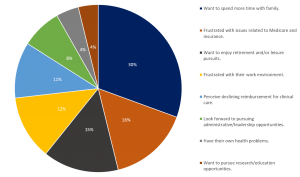2 min read
EHR Nox Dox
Jay Rath : 12.4.17 12:24 PM
Physicians are sick and tired of healthcare IT, and they’re not going to take it anymore; 51.6 percent of physicians who plan to reduce their clinical hours next year are either dissatisfied or very dissatisfied with the EHR. The same feeling is shared by 66.6 percent of physicians who plan to leave current practice within two years.
Those are among the disturbing findings recently reported by the Mayo Clinic in Professional Satisfaction and the Career Plans of U.S. Physicians. The study similarly finds that 50.4 percent of physicians are dissatisfied or very dissatisfied with Computerized Physician Order Entry (CPOE), and plan on reducing their hours; 65.8 percent plan on leaving current practice.
The paper’s authors are careful to separate correlation from causation, noting that “national studies of how the EHR affect(s) career plans have not been conducted to date.” But the trends are clear.
For reasons including significant dissatisfaction with healthcare IT, nearly one in five physicians plan to reduce clinical work hours in the next year. Roughly one in 50 physicians plan to leave medicine in the next two years, and pursue a different career.
The Mayo report footnotes national studies that suggest more than half of physicians “are experiencing professional burnout and that this proportion continues to increase.” The Department of Health and Human Services previously projected a shortfall of 45,000 to 90,000 physicians by the year 2025.
Mayo sought causes. Its objective was “to evaluate the relationship between burnout, satisfaction with electronic health records and work-life integration, and the career plans of U.S. physicians.” The American Medical Association Physician Masterfile served as database. Participation in the survey was voluntary, and responses were anonymous. More than 35,900 physicians were contacted during autumn, 2014, and 19.2 percent returned surveys. Of the 6695 physicians responding, 97.3 percent were in clinical practice.
Why do physicians want to reduce their hours? There are of course many causes:

As for the EHR and CPOE, the Mayo study is a perfect encyclopedia of dissatisfaction. Interestingly, the results show divides between those who intend to reduce their clinical hours within the next year versus those who plan to leave current practice within the next two years. This makes compare and contrast a little difficult, especially when the numbers present ironies. For example:
It’s perhaps understandable that 33.3 percent of physicians who are leaving “strongly disagree” that time spent on clerical tasks related to patient care is “reasonable.” But of those who just want to reduce their hours, only 27.2 percent agree that such time is unreasonable — still a high number, but why lower?
More physicians who are leaving current practice (23.3 percent) are “very satisfied” with the EHR, versus 15.2 percent who are reducing hours. On the other hand, 36 percent who are leaving are “very dissatisfied” with the EHR, as are 27.7 percent who are reducing hours.
Other factors, veiled under catch-all titles such as “work-life integration” and “burnout” are difficult to credit, since they may include EHR, CPOE and clerical numbers, besides other concerns. Nor does the Mayo study compare physician retirement rates versus those in the general population. (A reliable number is hard to find in any case. The boomer population, the economy and ever-changing public health benefits make it a moving target.)
What a person will say on a survey is different from what a person will actually do, but the Mayo authors suggest that many will follow through. “Available data suggest that 25 percent to 35 percent of physicians who indicate that they intend to leave medicine actually leave practice over the next three to five years.”
If that becomes real, “this loss would be roughly equivalent to eliminating the graduating class of 19 U.S. medical schools (average class size, 125 students) in each of the next two years.”

